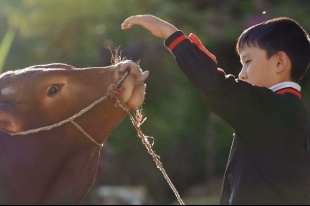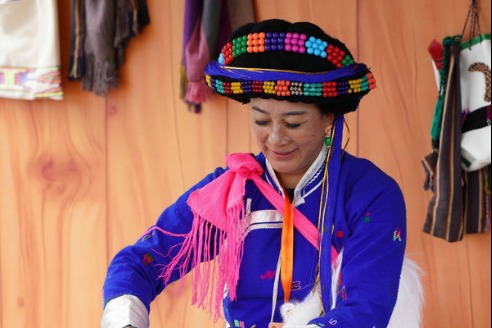Poetry lights children's imagination
Yunnan-based nonprofit embraces the power of verse to nurture students' intelligence and creativity, Yang Yang reports.

From an idea to a campaign
In October 2017, Kang registered Shiguang Poetry as a nonprofit, and then spent three months dragging her large suitcase on the rugged mountain roads. She managed to persuade 13 schools to start the "Four-Season Poetry Lessons" project, with a teaching plan, content and method she provided.
When she returned to Mangshui Middle School at the end of 2017, Yu told Kang that he had observed an interesting phenomenon. Adolescents used to break the windows of the headmaster's office with stones when they were not satisfied with him or with the teachers, but "now they learned to write about their anger in poems", he said.
"That's how we got our slogan: They used to crack (glass), but now they create," Kang says.
By March 2018, 70 schools in the countryside had joined the program to offer poetry lessons to students.
So far, the poetry lessons designed by the nonprofit have benefited 68,000 students in 823 primary and middle schools in 24 provinces and autonomous regions around the country, mostly in poor areas. Now Shiguang Poetry is run by three full-time workers, including Kang, 60 part-time workers, 280 backups and more than 1,000 volunteers.
The poetry lessons have four themes: light in spring, shade in summer, sound in autumn, and sun in winter, "carrying our hope that poetry can become a companion for children when they grow up", Kang says.
Huan Qinghua, a 15-year-old student at Jiangyu Middle School of Weifang, Shandong province, says that poetry is a listener to whom she can tell all kinds of stories-about big trees, father, fire and love. "With it, I don't feel lonely," she says.
Dong Yue, a 40-year-old teacher with Wangjia Primary School in Hunnan district of Shenyang, Liaoning province, has been a primary school teacher for 20 years. Dong says in order to enable students to get more from class, she started the poetry lessons in 2018. She found that the course can help to ignite children's imagination, broaden their mind, improve their Chinese language skills and increase their confidence, she says.
Yang Deli, 32, is a Chinese language teacher for sixth graders at Dashantou (literally meaning "big mountain head") Primary School, Mingde village, Mangshui town of Changning county, Yunnan province. As a lover of poetry, she sees the poetry lessons as a good aesthetic education for children in the countryside, "most of whose parents leave home for jobs in cities", she says.





































